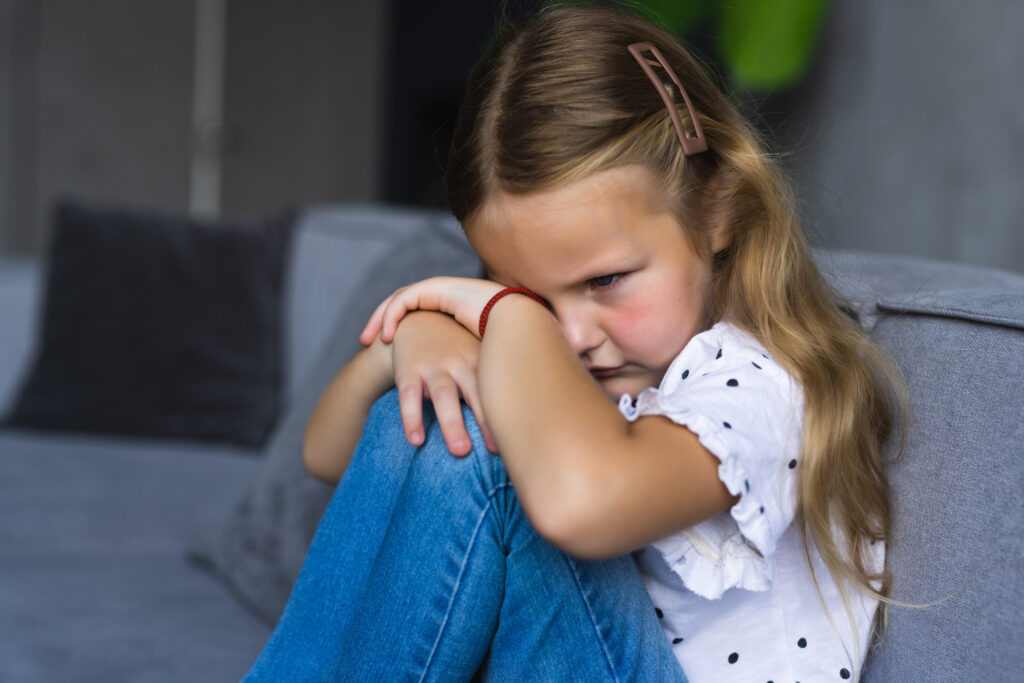The start of a new school year can be an exciting yet scary time. Regardless of what age your child is, starting school for the first time or starting a new grade can bring about a lot of anxiety and behavior changes. If your child is feeling apprehensive about school, they’re not alone. A “survey conducted online by The Harris Poll on behalf of the On Our Sleeves Movement for Children’s Mental Health, found 71% of American parents say their children experienced challenges last school year.”
In this post, learn about common triggers, ways to ease worries, and tools to help support so they feel less anxious about going back to school or continuing to go to school.
What is Back-to-School Anxiety?
Back-to-school anxiety is a type of stress that children may experience at the start of a new school year. This anxiety can manifest in various ways, such as nervousness about new routines, fear of meeting new peers, or concerns about academic performance. Recognizing these symptoms early can help you address them, because the problem will only continue if you ignore it or think they will be “okay” as the school year progresses.
Signs Your Child is Anxious
Children may not always express their anxiety verbally, so it’s important to watch for signs of abnormal behavior. These can include changes in appetite, trouble sleeping, or frequent complaints of stomach aches, headaches, or behavior changes like irritability, anger, and aggression. Being aware of these signs and acknowledging they need support is important for early intervention. It’s best to address fears and/or anxiety as soon as possible; the worst thing to do is to ignore it.
Common Triggers of School Anxiety
Several factors can trigger back-to-school anxiety. Some of these include changes in routine, separation from parents, social pressures, and academic expectations. Separation anxiety is especially prevalent for younger children. One thing you can do as a parent is to notmake dropping off your kid a big deal. It’s in our nature to linger, give extra hugs, or cry when we drop a child off at school, but these actions can reinforce your child’s separation anxiety. The bigger deal you make of being separated from them, the bigger deal they will think it is, and this can snowball into other issues.
Parental Anxiety
Could your child be mirroring your own anxiety? Another thing to be mindful of is any fear or anxiety you as the parent might have and be exhibiting. Kids are incredibly sensitive and can pick up on what you’re feeling. When going back to school, you may feel anxious about trying to get everything done before school starts like shopping for new clothes, getting their haircut, doctor appointments they need, etc. All this extra stress you put on yourself could end up manifesting in your children. You need to remember that getting everything done right before school isn’t always important. Give yourself some grace and do some of the errands after school starts, if possible.
Establishing a Routine & Discussing Expectations
Creating a consistent routine can help ease anxiety by providing a sense of stability. Incorporate daily activities like reading or homework at set times to help your child adjust to the new routine.
Open communication is key in how to help address any fears or anxiety. Talk to your child about what they should likely expect at school. Discuss their schedule, their teacher, upcoming school events, subjects they’ll be studying, and any extracurricular activities they might be interested in.
Talk to your child about the importance of kindness, empathy, and respect in peer relationships. Discuss strategies for dealing with conflicts and making new friends. Knowing more about what to expect in social interactions can help when your child communicates with peers, teachers, and school staff.
Visiting the School
Familiarity can reduce fear and anxiety. Take your child to visit their school, teacher, and classroom during orientation before school starts.. Let your child explore the school, check out the playground, and see where the restrooms are located because this can make the environment feel more comfortable and less intimidating. Be sure to inform their teachers and any necessary school staff about your child’s anxiety to ensure they receive any additional support that could be needed.
Depending on where you live, you may be able to have your child do a trial bus ride. The bus will come and get them at their pick-up spot, show them the bus route, go to the school, and then take them back to their drop-off spot. This can help make them feel more comfortable about the route, stops along the way, and the process for riding the bus.
Struggling at School
If your child goes back to school and is still struggling, there could be some other underlying factors that may not be easy to identify. If a child is being bullied at school, they may not necessarily tell you, but start to lose interest in school or avoid going to school. Make sure that your child understands if they’re being bullied it isn’t their fault, and they should tell you or another adult at the school so something can be done to stop it. This is where open communication is so important because if they feel comfortable telling you about trouble they’re experiencing, you can find resolutions and act to correct the problem as soon as possible.
Other factors that could be causing bad behavior or anxiety is the possibility of an underlying psychological or medical issue, or a. Some signs of this are struggling to get out of bed or sleeping all the time, which could signal they have depression and/or anxiety. If this happens repeatedly, it’s important to seek therapy for your child. If you suspect your child has an undiagnosed learning disorder or medical issue like dyslexia or dysgraphia, talk to your pediatrician to get a referral for a a developmental pediatrician. Development pediatricians are specialists that can test for and diagnose a wide range of potential issues such as anxiety, depression, autism, ADHD and learning disorders.
School refusal is when your child will absolutely not go to school, and it could lead to your child acting out and doing things to try and get expelled. According to the The Baker Center for Children and Families, school refusal is “most common in kids ages 5-11 years old [and is] often associated with anxiety disorders for younger children, and mood disorders for adolescents.” The worst thing you can do as a parent is ignore any issues your child is having and just let it pass. You need to be proactive so it doesn’t get worse.

Support from the School
If your child receives a diagnosis from a specialist, you may need to get an Individualized Education Plan (IEP) or 504 plan for your child. These public school plans provide individualized, additional support to your child in the classroom to help them be successful. For instance, for a child with anxiety, these plans would outline provisions for the teachers, administrators, and school counselor to employ if the student needs a space to calm down or requires their homework to be restructured. If your child has repeated bouts of anxiety about school, consider speaking to your pediatrician or therapist about next steps toward receiving one of these plans.
Support Network
Having a network of support will be crucial in helping your child manage anything that could be causing issues, and early intervention is key. Children’s therapy is something we specialize in, such as play therapy and sand tray therapy. If you have any questions or would like to schedule an appointment with one of our therapists, don’t hesitate to contact us so we can help you and your child navigate back-to-school anxiety and give them the skills they need to succeed.
